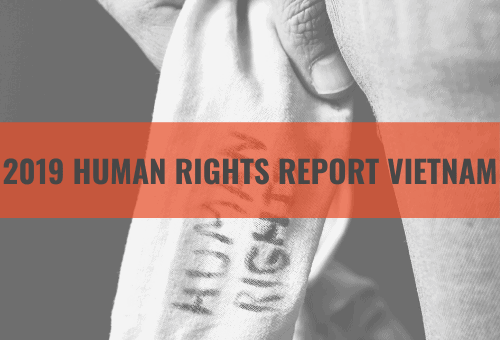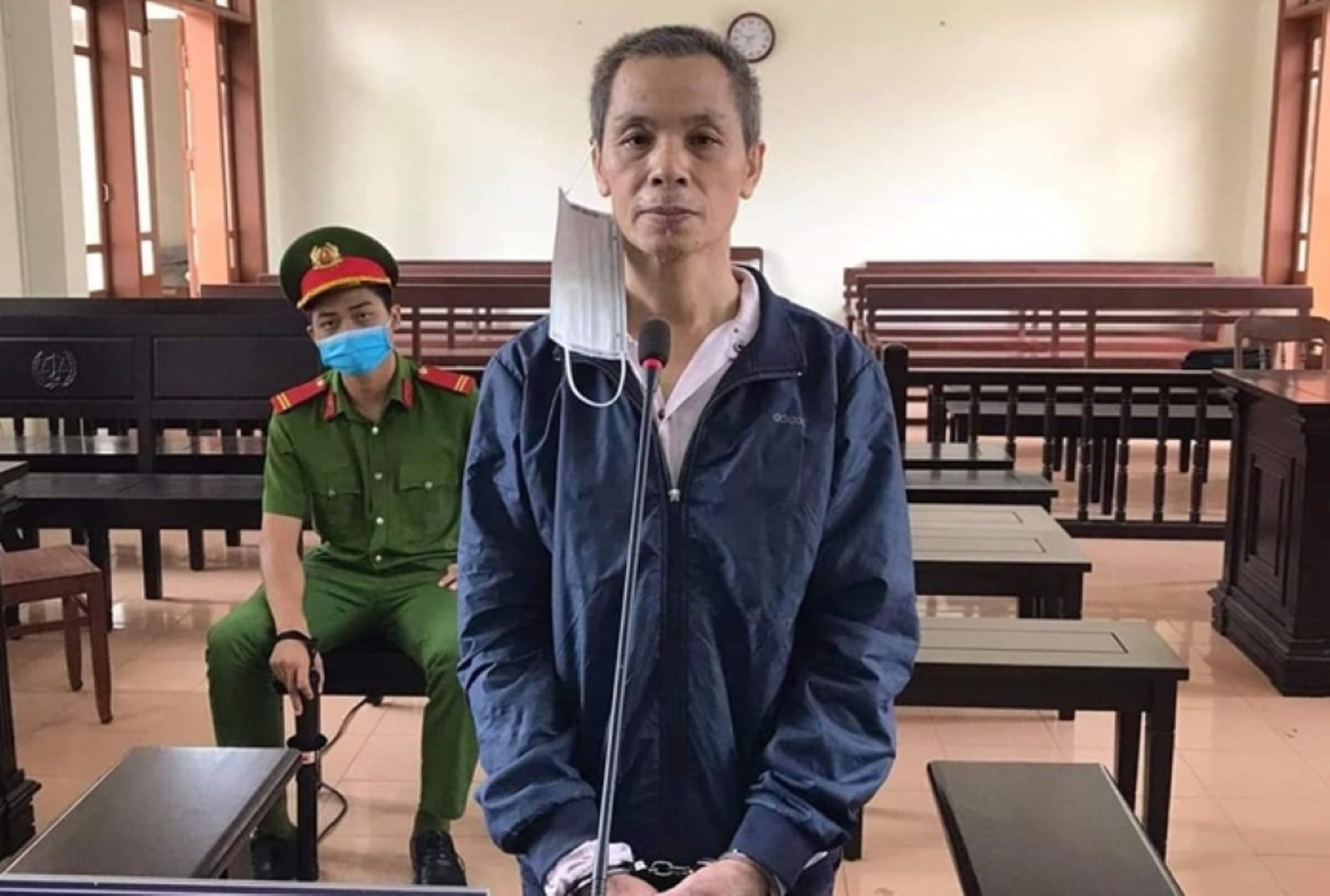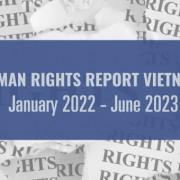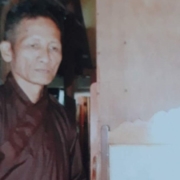Letter to Secretary Blinken re new wave of repression in Vietnam
December 31, 2024
Dear Secretary of State Antony Blinken,
It is a fact that as Vietnam has become increasingly repressive, the United States has given Hanoi a free pass on human rights. According to three former State Department officials interviewed by the Washington Post, the Biden administration has not made Hanoi’s intersifying repression of civil society a priority or conditioned new agreements, such as the elevation of diplomatic ties, on human rights improvements.[i]
Since 2020, Vietnam has shut down the only independent journalists’ association, the only independent publishing house, and the only independent anti-corruption organization operating in the country. At the same time, it has imprisoned the leadership of the climate change movement on false charges of tax evasion, arrested government reformers who were working to ratify ILO conventions on workers’ rights, and enacted extreme restrictions on foreign aid.[ii] This new wave of state repression has completely destroyed the nascent civil society that once existed in the country.
Hanoi’s deteriorating respect for human rights is apparent across several indicators, including:
- Respect for the integrity of the person.
- Denial of a fair public trial.
- Transnational repression.
- Respect for civil liberties.
- Freedom of expression.
- Freedom of peaceful assembly and association.
- Governmental posture towards human rights groups.
- Worker rights.
- The right to collective bargaining.
- Prohibition of forced or compulsory labor.
Respect for the integrity of the person
Denial of a fair public trial
Despite lofty guarantees of judicial independence in the country’s constitution, courts and judges in Vietnam are supervised by the state and direct political interference in trials is common.[iii] Starting at the top, the chief justice of the Supreme People’s Court and the chief procurator of the Supreme People’s Procuracy (the prosecutorial authority) are ostensibly elected and supervised by the National Assembly.
Candidates for both positions are, however, preselected from members of the Central Party Committee-the most powerful organ of the Communist Party of Vietnam (CPV)-and party policy dictates that these positions are also under “direct management” of the CPV’s Political Bureau.[iv] As such, both the chief justice of the Supreme People’s Court, who oversees the selection of judges, and the chief procurator of the Supreme People’s Procuracy, who oversees the selection of prosecutors, are political appointees who must answer to the party’s top brass. Supreme court judges and prosecutors are also subordinated to the party, with both groups supervised by the Secretariat of the Central Party Committee.
The lack of judicial independence is espcially problematic when it comes to mass trials in which scores of people are setnced to prison, as happened in 2024. The Vietnamese government maintains that on June 11, 2023, 70 people attacked government offices and police stations in Cu Kuin district of Dak Lak province. The attacks left two local officials, four police officers, and three civilians dead. The reaction from the government was swift: ninety-four people were rounded up and detained.
Over the course of six days, the People’s Court of Dak Lak Province convicted 100 defendants in the case. Of these, 98 were convicted of terrorism charges under articles 113 (‘terrorism to oppose the people’s government’) and 299 (‘terrorism’) of the criminal code. Two others were convicted under Article 348—one for ‘organizing illegal entries and exits’ and one for ‘providing havens for criminals’.[v]
The defendants were tried in a mobile trial. Mobile trials are held in public spaces to humiliate and shame defendants and are generally considered to violate international legal standards.[vi] Vietnam has continued to use mobile trials in recent years, despite claims to the contrary.[vii] Journalists from international media organizations were not permitted to observe the trial.
While the majority of the defendants are from the Ede ethnic group, several of those convicted are members of the Mnong and Gia Rai communities. Almost all of the defendants worked as farmhands, and most are Protestants. Many defendants could only speak indigenous languages and had to rely on interpreters at trial, of which there were only four. Twenty lawyers represented all 100 defendants.
The defendants received prison sentences ranging from nine months to life in prison. Ten defendants were sentenced to life in prison. Another 24 received sentences of more than 10 years in prison.
Arrest warrants were issued for two others who, it is alleged, committed suicide before they could be arrested. Another defendant, Y Bum Bya, died in custody after reportedly being tortured.[viii] Hanoi contests the allegations of torture and claims that Bya committed suicide, although has not provided additional details about his detention, including when and for how long he was held. To date, the United States has not issued a public statement expressing concern about the conviction of 100 people in a single trial that did not meet basic legal standards.
Transnational repression
With criticism of its rights record muted, the Vietnamese government appears more empowered to use repression beyond its own borders. Emblematic cases of such repression include those of Y Quynh Bdap and Duong Van Thai.
In June 2024, Vietnam made a request to Thailand for the extradition of Y Quynh Bdap, an Ede activist living in exile in Bangkok who was one of the 100 people convicted in relation to the Dak Lak attacks.[ix] Hanoi claimed that Bdap led the attacks, even though he was in Thailand at the time.[x] Bdap, who maintains his innocence, was convicted of terrorism in absentia and sentenced to 10 years in prison.[xi]
To date, the Vietnamese government has made little information about the case against the alleged Dak Lak attackers public. It has not published the criminal investigation report, the indictment, the court decision, or details about Y Quynh Bdap’s alleged role in the attacks. Project88, however, recently obtained a copy of the court decision, which Hanoi submitted to the Thai court as part of the extradition hearing, and published it.
Bdap now faces imminent deportation after a Thai court ruled in late September that there are no legal barriers to extraditing him.[xii] The court acknowledged that Thai law prohibits extradition when there is a substantial risk of torture or ill-treatment, although concluded that it did not have the authority to determine whether this risk existed in Bdap’s case.[xiii] One of the lawyers representing Bdap told Project88 that if no country comes forward to offer him asylum within the next month, then he will almost certainly be extradited to Vietnam. Bdap applied for asylum in Canada but Ottawa stalled his application after Vietnam announced the terrorism charges against him.
The US government has cooperated with Vietnam’s investigation into the Dak Lak attacks but has not been transparent about what information it has shared with Hanoi, while failing to issue a public statement expressing concern about Bdap’s imminent extradition to Vietnam. Y Quynh Bdap remains in custody in Thailand. The Thai court’s ruling on Sept. 30, 2024, gave Thailand 90 days to carry out an extradition. If he is returned to Vietnam, Bdap faces 10 years in prison in a penal system marred with abuses.
Respect for civil liberties
Freedom of expression
While never a beacon of open debate and discourse, Vietnam has increasingly restricted the right to freedom of expression in recent years. After hardliners took control of the Communist Party of Vietnam (CPV) in 2016, authorities have imprisoned scores of dissidents and forcibly closed numerous independent civil society and media organizations.[xiv]
Since that year, a raft of new policies and practices have been enacted that aim to restrict political speech. These include laws which have helped expand the censorship regime in the country, including the Cybersecurity Law, the Law on the Press, the Law on Telecommunications, and the Law on Information Technology, as well as numerous implementing decrees. In addition, several laws have been introduced which together have deprived the Vietnamese people of privacy online, including a draft law on data protection introduced in September 2024, and Decree 147 on social media, which was issued in November 2024. Finally, while the country’s legal framework for access to information was created by the Law on Access to Information, contradictory policies such as the Law on Protection of State Secrets prevent people from obtaining much information that should be publicly available.
These policies aim to restrict political speech by expanding the censorship system, granting the government legal permission to access user data, and preventing the Vietnamese people from accessing information. Such measures add to an existing framework of criminal and administrative penalties that punish criticism of the government. Together, these restrictions have created a legal apparatus that severely limits people’s ability to speak out or advocate for changes in policy.
Just last month, on November 9, 2024, the Vietnamese government issued Decree 147/2024/NĐ-CP, which grants additional control to the government over online activities.[xv] Under the decree, social media platforms operating in Vietnam must store user data in the country, collect the phone numbers or ID numbers of their users, and provide this information to the government upon request.[xvi] In addition, Decree 147 orders internet providers to block users and remove content deemed illegal after a request from Vietnamese authorities.[xvii] Finally, the decree empowers the government to hold the owners of public internet access points liable if people use their Wi-Fi network to post illegal content.[xviii]
In another troubling development concerning freedom of expression, Hanoi has not only continued arresting journalists, but has also begun to imprison their sources. On October 30, 2024, Duong Van Thai, a prominent Vietnamese blogger who was mentioned in last year’s State Department Report, was sentenced to 12 years in prison.[xix] It is widely-believed state agents kidnapped him in broad daylight just north of Bangkok on April 13, 2023 and brought him to Vietnam, where he was put on trial.[xx]
Thai relied on an extensive network of sources, including state officials, to expose information about Vietnam’s leaders and policies. Project88 obtained a copy of the court decision that sentenced Thai to prison. The decision reveals that seven people, five of whom were state or party officials, were also sentenced to prison for providing information to Thai. At least 60 people were criminally investigated as part of the case.[xxi]
Freedoms of Peaceful Assembly and Association
In addition to restricting freedom of speech, Hanoi has also placed increased restrictions on freedom of association in the past year. On October 8, 2024, the Vietnamese government enacted Decree 126.[xxii] Compared to Decree 45, which it replaces, the new decree makes it more difficult to establish an association and gives the government more power to control and monitor the activities and funding sources of associations once they are established.[xxiii] Most notably, Decree 126 grants the government the power to suspend and dissolve associations—a power it did not have previously.[xxiv]
According to the government, Decree 126 was needed to:
- Ensure party control over associations.[xxv]
- Prevent foreign influence on domestic affairs.[xxvi]
- Increase government control over the funding of associations.[xxvii]
- Create the legal authority to suspend and dissolve associations.[xxviii]
Decree 126 places restrictions on associations operating in Vietnam.[xxix] Specifically, it:
- Makes it more difficult to establish an association.
- Forces associations to receive prior approval before they can operate.
- Gives the government more power to control and monitor associations.
- Grants the government broad powers to suspend and dissolve associations.
Decree 126 is the latest in a series of policy measures that are part of a new wave of repression in the country. This wave of repression has resulted in the forced closure of organizations and has made it extremely difficult for NGOs and civil society organizations to operate. Decree 126 is the latest in a series of policies that, whatever their stated aims, will further suppress Vietnamese civil society.
Governmental Posture
Towards human rights groups
Just two months before President Biden upgraded diplomatic relations with Vietnam in September 2023, the country’s top leaders issued a secret national security directive.[xxx] Directive 24 frames all forms of international cooperation and commerce as threats to national security and orders the government to deal with these perceived threats by systematically violating the rights of the country’s 100 million citizens.[xxxi]
The directive aims to subvert democratic control over public policy and the economy, while shoring up one-party rule. If implemented as intended, the directive will lead to systematic and widespread human rights violations, including impermissible restrictions on assembly, association, speech, the media, and movement. It will also result in violations of the right to participate in public affairs, and the right of workers to form independent trade unions and syndicates.
In its decision to continue classifying Vietnam as a non-market economy country, the Commerce Department credited Project88’s revelations about Directive 24 with helping reach that decision.[xxxii] The Commerce Department stated:
The described alignment of the VGCL [Vietnam General Confederation of Labour} with the CPV’s policies exemplifies the Vietnamese government’s resistance to the formation of independent unions. Another illustrative example is “Directive 24”, an internal CPV document issued by the CPV’s central committee in July 2023. Commerce cannot independently confirm the authenticity of this document. However, if authentic in part or in whole, it should be noted that “Directive 24” explicitly prohibits the existence of independent unions and reinforces government and party control over labor organizations. It also suggests an ongoing effort by the CPV to maintain tight control over labor unions (p.38).
In his response to questions by the Commerce Department about the directive, Vietnam’s Minister of Industry and Trade defended key provisions of Directive 24, thereby tacitly admitting that the directive is real.[xxxiii]
While the Commerce Department has publicly commented on Directive 24, the State Department has refused to do so. In its 2023 report on the human rights situation in Vietnam, the State Department did not mention the directive, despite it being the most significant human rights development in years.[xxxiv] Directive 24 reveals that Vietnam has no genuine intention to fulfill its human rights commitments. This means that Hanoi’s formal ratification of international agreements cannot be equated with concrete progress on human rights, a fact that the State Department should acknowledge in its upcoming report on Vietnam.
Vietnam’s energy transition
Vietnam and its partner countries, including the US, have failed to live up to their obligations under the Just Energy Transition Partnership.[xxxv] Under the JETP, the US and others committed to mobilize $15.5 billion in funding to shift the country away from fossil fuels.[xxxvi] In return, Vietnam promised it would phase out coal and consult NGOs and the media when making decisions to ensure the transition is implemented in a just manner.[xxxvii] Thus far, this has not been the case.
The governments funding Vietnam’s energy transition have only mobilized a fraction of the pledged money, and, instead of providing grants to the Vietnamese government, have instead committed the funding in the form of commercial loans.[xxxviii]
Vietnam, for its part, has not phased out coal. Instead, it has prioritized energy security over the transition, opening new coal mines and dramatically increasing imports of coal.[xxxix] And Hanoi recently announced that in 2025, coal plants will continue operating at high levels.[xl]
Further, instead of ensuring the public had a voice in key decisions about the transition, the government has effectively criminalized activism on energy policy by imprisoning six leaders of the country’s climate change movement on false charges, while outlawing all efforts to influence policymaking and monitor the country’s compliance with international agreements, even from government insiders.[xli] Members of the JETP, including the United States, have acknowledged that there is no mechanism for the public to participate in the country’s energy transition.[xlii]
Worker rights
The right to collective bargaining
Another novel development is that Hanoi has begun to target government reformers who are working to promote human rights. Over the past year, Vietnam has jailed current and former government officials who, at the time of their arrest, were working directly with the government on official policy priorities. Nguyen Van Binh, a government official who was leading efforts to guarantee the right of workers to form independent trade unions; Vu Minh Tien, a government official who was spearheading efforts to amend the Trade Union Law; and Ngo Thi To Nhien, a consultant who worked with the government on the country’s energy transition, have all been arrested since September 2023.[xliii]
The Biden administration has centered global labor rights as essential to America’s national security and foreign policy objectives.[xliv] In statements regarding the human rights situation in Vietnam, US authorities have pointed to ‘notable improvements to align domestic labor laws with international standards’.[xlv] The arrest of Tien and Binh, however, demonstrate that Vietnam is showing less respect for worker rights.
Prohibition of Forced or Compulsory Labor
On June 24, 2024, the United States released its annual report on the efforts by foreign governments to address trafficking in persons.[xlvi] In the report, Vietnam was upgraded to Tier 2 status on the basis that ‘the government demonstrated overall increasing efforts compared with the previous reporting period’.[xlvii]
In the lead-up to the TIP report, however, Project88 uncovered evidence, that we communicated to you, which contradicted this assessment.[xlviii] We found that:
- Vietnam failed to hold to account government officials involved in human trafficking.
- Vietnam politicized the TIP process by using its diplomatic leverage with the US to upgrade the country’s TIP ranking.
- Vietnam deliberately deceived the US government about the country’s efforts to address human trafficking.
The documents make clear that, rather than taking concrete measures to eliminate trafficking in persons, Vietnam instead deliberately misled the State Department. Vietnamese officials revealed a plan to withhold information from the State Department in order to paint the country in a better light. Unfortunately, it appears that due to perceived (yet questionable) geo-political priorities, American officials went along with this ruse, and upgraded Hanoi’s tier ranking.
Recommendations
In the past few years, Vietnam has unleashed a new wave of repression and Washington has given it a free pass. Perceived geopolitical interests have led America and its allies to turn a blind eye to intensifying repression in the country. In light of the analysis presented above, Project88 recommends that the State Department:
- Acknowledge that there has been a significant negative change in the human rights sitution in Vietnam in your upcoming Country Reports on Human Rights Practices.
- Describe the various dimensions of this new wave of repression in the report on Vietnam.
Thank you for your consideration, and we look forward to your response.
Sincerely,
Ben Swanton
Co-director
Project88
[i] As Vietnam tightens leash on criticism, scores are jailed and exiled (2024, Aug. 14). Washington Post. Retrieved Dec. 26, 2024, from https://web.archive.org/web/2/https://www.washingtonpost.com/world/2024/08/14/vietnam-human-rights-crackdown/
[ii] Project88 (2023, Dec. 19). Human Rights Report Vietnam January 2022-June 2023. Retrieved Jan. 5, 2024, from https://web.archive.org/web/2/https://the88project.org/wp-content/uploads/2023/12/Annual-Report-2022-23_121523.pdf
[iii] Sidel, Mark (2009). The constitution of Vietnam: a contextual analysis. Hart Publishing. https://web.archive.org/web/20230421214658/https://www.bloomsburycollections.com/book/the-constitution-of-vietnam-a-contextual-analysis/
[iv] Conclusion 35-KL/TW of the Political Bureau of the Communist Party specifies that both the Chief Justice of the Supreme People’s Court and the Chief Procurator of the Supreme People’s Procuracy are under the direct management of the Political Bureau and the Secretariat of the Central Party Committee respectively.
Võ, Văn Thưởng (2022, May 5). Kết Luận Của Bộ Chính Trị Về Danh Mục Chức Danh, Chức Vụ Lãnh Đạo Và Tương Đương Của Hệ Thống Chính Trị Từ Trung Ương Đến Cơ Sở, № 35-KL/TW. Thư Viện Pháp Luật. Retrieved Dec. 4, 2022, from https://web.archive.org/web/20241231041034/https://thuvienphapluat.vn/van-ban/Bo-may-hanh-chinh/Ket-luan-35-KL-TW-2022-chuc-danh-lanh-dao-cua-he-thong-chinh-tri-tu-Trung-uong-den-co-so-514410.aspx
[v] Slow, Oliver (2024, Jan. 16). Vietnam rebel attacks: 98 go on trial accused of killing nine people. BBC. Retrieved Dec. 27, 2024, from https://web.archive.org/web/20241231041745/https://www.bbc.com/news/world-asia-67995372
[vi] Experts condemn misuse of counter-terrorism law against Montagnards in Viet Nam (2024, Aug. 28). OHCHR. Retrieved Dec. 27, 2024, from https://web.archive.org/web/20240829000635/https://www.ohchr.org/en/press-releases/2024/08/experts-condemn-misuse-counter-terrorism-law-against-montagnards-viet-nam
[vii] Vietnam: UN Review Should Call for Urgent Reform (2024, April 22). Human Rights Watch. Retrieved Dec. 27, 2024, from https://web.archive.org/web/20241231043253/https://www.hrw.org/news/2024/04/22/vietnam-un-review-should-call-urgent-reform
[viii] Experts condemn misuse of counter-terrorism law against Montagnards in Viet Nam (2024, Aug. 28). OHCHR. Retrieved Dec. 27, 2024, from https://web.archive.org/web/20240829000635/https://www.ohchr.org/en/press-releases/2024/08/experts-condemn-misuse-counter-terrorism-law-against-montagnards-viet-nam
See also Vietnam’s response: https://web.archive.org/web/20241231043212/https://spcommreports.ohchr.org/TMResultsBase/DownLoadFile?gId=38749
[ix] Project88. Y Quynh Bdap. Database, Retrieved Dec. 27, 2024, from https://web.archive.org/web/20241231044059/https://the88project.org/profile/612/y-quynh-bdap/
[x] Mastermind behind deadly terror attacks in Vietnam’s Dak Lak to be extradited from Thailand (Oct. 19, 2024). Tuoi Tre News. Retrieved Dec. 27, 2024, from https://web.archive.org/web/20241231044119/https://tuoitrenews.vn/news/society/20241019/mastermind-behind-deadly-terror-attacks-in-vietnams-dak-lak-to-be-extradited-from-thailand/82500.html
[xi] Extradition of Terrorist Y Quynh Bdap from Thailand to VN confirmed appropriate (2024, Oct. 17). Vietnamnet. Retrieved Dec. 27, 2024 from https://web.archive.org/web/20241231044508/https://vietnamnet.vn/en/extradition-of-terrorist-y-quynh-bdap-from-thailand-to-vn-confirmed-appropriate-2332956.html
[xii] Court approves extradition of Vietnamese activist (2024, Oct. 4). Bangkok Post. Retrieved Dec. 27, 2024, from https://web.archive.org/web/20241006200458/https://www.bangkokpost.com/thailand/general/2877713/court-approves-extradition-of-vietnamese-activist
[xiii] Thailand: Court ruling puts human rights defender in danger if extradited to Viet Nam, say experts (2024, Oct. 16). OHCHR. Retrieved Dec. 27, 2024, from https://www.ohchr.org/en/press-releases/2024/10/thailand-court-ruling-puts-human-rights-defender-danger-if-extradited-viet
[xiv] See Swanton, Ben (2023). Weaponizing the law to prosecute the Vietnam Four. Project88. https://web.archive.org/web/2/https://the88project.org/wp-content/uploads/2023/04/Weaponizing-the-law-report-Project-88-ENG.pdf
[xv] Hồ, Đức Phớc (2024, Nov. 9). Nghị Định Quản lý, cung cấp, sử dụng dịch vụ internet và thông tin trên mạng, No. 147/2024/NĐ-CP. Cổng Thông Tin Điện Tử Chính Phủ. Retrieved Nov. 22, 2024, from https://web.archive.org/web/20241122100058/https://datafiles.chinhphu.vn/cpp/files/vbpq/2024/11/147-nd.signed.pdf
[xvi] Hồ, Đức Phớc (2024, Nov. 9). Nghị Định Quản lý, cung cấp, sử dụng dịch vụ internet và thông tin trên mạng, No. 147/2024/NĐ-CP. Cổng Thông Tin Điện Tử Chính Phủ. Retrieved Nov. 22, 2024, from https://web.archive.org/web/20241122100058/https://datafiles.chinhphu.vn/cpp/files/vbpq/2024/11/147-nd.signed.pdf
[xvii] Hồ, Đức Phớc (2024, Nov. 9). Nghị Định Quản lý, cung cấp, sử dụng dịch vụ internet và thông tin trên mạng, No. 147/2024/NĐ-CP. Cổng Thông Tin Điện Tử Chính Phủ. Retrieved Nov. 22, 2024, from https://web.archive.org/web/20241122100058/https://datafiles.chinhphu.vn/cpp/files/vbpq/2024/11/147-nd.signed.pdf
[xviii] Hồ, Đức Phớc (2024, Nov. 9). Nghị Định Quản lý, cung cấp, sử dụng dịch vụ internet và thông tin trên mạng, No. 147/2024/NĐ-CP. Cổng Thông Tin Điện Tử Chính Phủ. Retrieved Nov. 22, 2024, from https://web.archive.org/web/20241122100058/https://datafiles.chinhphu.vn/cpp/files/vbpq/2024/11/147-nd.signed.pdf
[xix] Hanoi imprisons five state and party officials, along with kidnapped blogger alleged to have received information from them (2024, Dec. 9). Project88. Retrieved Dec. 25, 2024, from https://web.archive.org/web/2/https://the88project.org/hanoi-imprisons-five-state-and-party-officials-along-with-kidnapped-blogger-alleged-to-have-received-information-from-them/
[xx] Hanoi imprisons five state and party officials, along with kidnapped blogger alleged to have received information from them (2024, Dec. 9). Project88. Retrieved Dec. 25, 2024, from https://web.archive.org/web/2/https://the88project.org/hanoi-imprisons-five-state-and-party-officials-along-with-kidnapped-blogger-alleged-to-have-received-information-from-them/
[xxi] Hanoi imprisons five state and party officials, along with kidnapped blogger alleged to have received information from them (2024, Dec. 9). Project88. Retrieved Dec. 25, 2024, from https://web.archive.org/web/2/https://the88project.org/hanoi-imprisons-five-state-and-party-officials-along-with-kidnapped-blogger-alleged-to-have-received-information-from-them/
[xxii] Nguyễn, Hòa Bình (2024, Oct. 8). Nghị Định Quy Định Về Tổ Chức, Hoạt Động Và Quản Lý Hội, No. 126/2024/NĐ-CP. Cơ Sở Dữ Liệu Văn Bản Pháp Luật Trung Ương. Retrieved Oct. 18, 2024, from https://web.archive.org/web/2/https://web.archive.org/web/20241208062219/https://vbpl.vn/TW/Pages/vbpq-van-ban-goc.aspx?ItemID=170319&Keyword=nghi%20dinh%20126%20hoi
[xxiii] Altman-Lupu, Michael & Swanton, Ben (2024, Dec. 16). Tightening the screws on civil society: Decree 126 on associations. Project88. https://web.archive.org/web/2/https://the88project.org/wp-content/uploads/2024/12/Decree-126-policy-analysis-Project88-embargoed-until-161224.pdf
[xxiv] Altman-Lupu, Michael & Swanton, Ben (2024, Dec. 16). Tightening the screws on civil society: Decree 126 on associations. Project88. https://web.archive.org/web/2/https://the88project.org/wp-content/uploads/2024/12/Decree-126-policy-analysis-Project88-embargoed-until-161224.pdf
[xxv] Phạm, Thị Thanh Trà (2022). Tờ Trình Về việc ban hành Nghị định thay thế Nghị định số 45/2010/NĐ-CP ngày 21/4/2010 của Chính phủ quy định về tổ chức, hoạt động và quản lý hội, No. /TTr-BNV. Bộ Nội Vụ. Retrieved Nov. 19, 2024 from https://web.archive.org/web/20230201055421/https://vibonline.com.vn/wp-content/uploads/2022/08/totrinhndquanlyhoi-2.pdf
[xxvi] Phạm, Thị Thanh Trà (2022). Tờ Trình Về việc ban hành Nghị định thay thế Nghị định số 45/2010/NĐ-CP ngày 21/4/2010 của Chính phủ quy định về tổ chức, hoạt động và quản lý hội, No. /TTr-BNV. Bộ Nội Vụ. Retrieved Nov. 19, 2024 from https://web.archive.org/web/20230201055421/https://vibonline.com.vn/wp-content/uploads/2022/08/totrinhndquanlyhoi-2.pdf
[xxvii] Không Được Lợi Dụng Hoạt Động Của Hội, Quỹ (2022, Oct. 10). Hội Nghệ Nhân Và Thương Hiệu Việt Nam. Retrieved Nov. 19, 2024 from https://web.archive.org/web/20240526105526/https://vata.org.vn/tin-tuc/khong-duoc-loi-dung-hoat-dong-cua-hoi-quy
[xxviii] Không Được Lợi Dụng Hoạt Động Của Hội, Quỹ (2022, Oct. 10). Hội Nghệ Nhân Và Thương Hiệu Việt Nam. Retrieved Nov. 19, 2024 from https://web.archive.org/web/20240526105526/https://vata.org.vn/tin-tuc/khong-duoc-loi-dung-hoat-dong-cua-hoi-quy
[xxix] Altman-Lupu, Michael & Swanton, Ben (2024, Dec. 16). Tightening the screws on civil society: Decree 126 on associations. Project88. https://web.archive.org/web/2/https://the88project.org/wp-content/uploads/2024/12/Decree-126-policy-analysis-Project88-embargoed-until-161224.pdf
[xxx] Swanton, Ben & Altman-Lupu, Michael (2024, Mar. 1). Vietnam’s leaders declare war on human rights as a matter of official policy: An analysis of secret Directive 24. Project88. https://web.archive.org/web/2/https://the88project.org/wp-content/uploads/2024/02/D24-report-final.pdf
[xxxi] Swanton, Ben & Altman-Lupu, Michael (2024, Mar. 1). Vietnam’s leaders declare war on human rights as a matter of official policy: An analysis of secret Directive 24. Project88. https://web.archive.org/web/2/https://the88project.org/wp-content/uploads/2024/02/D24-report-final.pdf
[xxxii] See: https://web.archive.org/web/20241231045905/https://the88project.org/wp-content/uploads/2024/08/4607490-02.pdf
[xxxiii] See https://web.archive.org/web/2/https://www.regulations.gov/comment/ITA-2023-0010-0107
[xxxiv] 2023 Country Reports on Human Rights Practices: Vietnam. US Department of State. Retrieved Dec. 27, 2024, from https://web.archive.org/web/20241220190025/https://www.state.gov/reports/2023-country-reports-on-human-rights-practices/vietnam/
[xxxv] Altman-Lupu, Michael & Swanton, Ben (2024, Aug. 15). Apocalypse soon? Vietnam’s unjust energy transition. Project88. https://web.archive.org/web/20241001114259/https://the88project.org/wp-content/uploads/2024/08/Apocalypse-soon-Project88-FINAL.pdf
[xxxvi] Socialist Republic of Viet Nam (2023, November). Resource Mobilisation Plan. p. 8. Retrieved Dec. 10, 2023, from https://web.archive.org/web/20240711013358/https://climate.ec.europa.eu/system/files/2023-12/RMP_Viet%20Nam_Eng_%28Final%20to%20publication%29.pdf
[xxxvii] Trần, Thường (2022, Aug. 29). Thủ Tướng: Chuyển Đổi Năng Lượng Tại Việt Nam Phải Bảo Đảm Công Bằng, Công Lý. Vietnamnet. Retrieved Feb. 2, 2024, from https://web.archive.org/web/20240711041301/https://vietnamnet.vn/thu-tuong-chuyendoi-nang-luong-tai-viet-nam-phai-bao-dam-cong-bang-cong-ly-2054622.html
[xxxviii] Socialist Republic of Viet Nam (2023, November). Resource Mobilisation Plan. p. 8. Retrieved Dec. 10, 2023, from https://web.archive.org/web/20240711013358/https://climate.ec.europa.eu/system/files/2023-12/RMP_Viet%20Nam_Eng_%28Final%20to%20publication%29.pdf
[xxxix] Maguire, Gavin (2024, June 5). Vietnam’s coal use and emissions set new records. Reuters. Retrieved June 21, 2024, from https://web.archive.org/web/20240714041149/https://www.reuters.com/markets/asia/vietnams-coal-use-emissions-set-newrecords-2024-06-05/
Guarascio, Francesco & Vu, Khanh (2024, March 26). Vietnam boosts coal imports as it promises investors no more power cuts. Reuters. Retrieved April 2, 2024, from https://web.archive.org/web/20240420024833/https://www.reuters.com/markets/commodities/vietnam-boosts-coal-imports-itpromises-investors-no-more-power-cuts-2024-03-26/
[xl] Vietnam says its coal-fired power plants to operate at high levels next year (2024, Nov. 28). Reuters. Retrieved Dec. 17, 2024 from https://web.archive.org/web/2/https://www.reuters.com/business/energy/vietnam-says-its-coal-fired-power-plants-operate-high-levels-next-year-2024-11-18/
[xli] Altman-Lupu, Michael & Swanton, Ben (2024, Aug. 15). Apocalypse soon? Vietnam’s unjust energy transition. Project88. https://web.archive.org/web/20241001114259/https://the88project.org/wp-content/uploads/2024/08/Apocalypse-soon-Project88-FINAL.pdf
[xlii] Socialist Republic of Viet Nam (2023, November). Resource Mobilisation Plan. p. 90. Retrieved Dec. 10, 2023, from https://web.archive.org/web/20240711013358/https://climate.ec.europa.eu/system/files/2023-12/RMP_Viet%20Nam_Eng_%28Final%20to%20publication%29.pdf
[xliii] Swanton, Ben & Altman-Lupu, Michael (2024, May 6). Vietnam arrests labor reformer ahead of Commerce Department hearing on country’s market status. Project88. https://web.archive.org/web/20240708103517/https://the88project.org/wpcontent/uploads/2024/05/Nguyen-Van-Binh-report-Project88.pdf
Project88 (2024, May 20). Vietnam arrests second trade unionist in a month as minister of public security named president. https://web.archive.org/web/20240729095457/https://the88project.org/wpcontent/uploads/2024/05/Vu_Minh_Tien_press_release_-_Project88.pdf
Swanton, Ben & Altman-Lupu, Michael (2023). Understanding the arrest of energy think tank chief Ngo Thi To Nhien. Project88. https://web.archive.org/web/20240712071605/https://the88project.org/wp-content/uploads/2023/11/Understanding-thearrest-of-energy-policy-researcher-Ngo-Thi-To-Nhien-Project88-compressed.pdf
[xliv] (2023, Nov. 16). Secretary Antony J. Blinken at the Rollout of the Presidential Memorandum on Advancing Worker Empowerment, Rights, and High Labor Standards Globally. US Department of State. Retrieved Feb. 7, 2024, from https://webcf.waybackmachine.org/web/20241231084438/https://www.state.gov/secretary-antony-j-blinken-at-the-rollout-of-the-presidential-memorandum-on-advancing-worker-empowerment-rights-and-high-labor-standards-globally/
[xlv] (2023, Nov. 2). Under Secretary Zeya’s Remarks for the 27th US-Vietnam Human Rights Dialogue. US Department of State. Retrieved Feb. 7, 2024, from https://web.archive.org/web/20241231050036/https://www.state.gov/under-secretary-zeyas-remarks-for-27th-u-s-vietnam-human-rights-dialogue/
[xlvi] 2024 Trafficking in Persons Report: Vietnam (2024). US Department of State. Retrieved Dec. 17, 2024, from https://web.archive.org/web/20241217074724/https://www.state.gov/reports/2024-trafficking-in-persons-report/vietnam/
[xlvii] 2024 Trafficking in Persons Report: Vietnam (2024). US Department of State. Retrieved Dec. 17, 2024, from https://web.archive.org/web/20241217074724/https://www.state.gov/reports/2024-trafficking-in-persons-report/vietnam/
[xlviii] Swanton, Ben & Altman Lupu, Michael. (2024, June 20). Is the State Department Helping Vietnam to get away with human trafficking? Vietnamese internal documents reveal cover-up of government officials involved in trafficking ring. Project88. https://web.archive.org/web/20240704081441/https://the88project.org/wp-content/uploads/2024/06/Vietnam-TIP-Project88-embargoed-June-20-9am-ET.pdf







